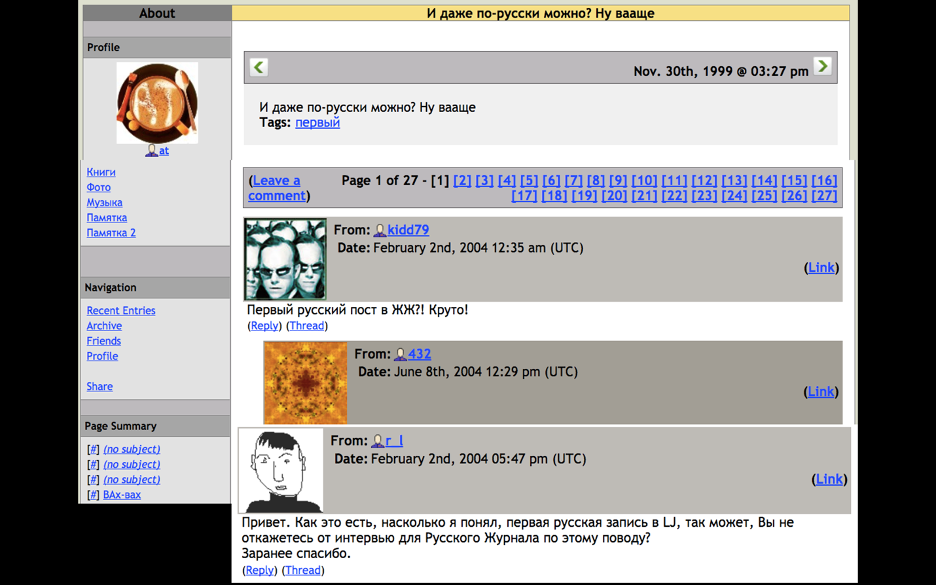First Russian-language LiveJournal Post

30 Nov 1999 – user “at”
At 3:27 PM on 30 November 1999, a user by the name of “at” discovered that the popular blogging platform and proto-social network LiveJournal supported Cyrillic. The site’s very first post in Russian, “I dazhe po-russki mozhno? Nu vaashche [Wait, you can even post in Russian? Waoaoaoaaahhhh]” announces the new possibility in an idiom already native to the platform. The misspelling of “voobshche” anticipates the widespread use of non-normative spellings online that would come to be known as Padonskii or Olbanskii (“падонский/олбанский йезыг” or even “йАзЫг пАдОнКаФф”).
LiveJournal, soon known by its Russian acronym ZhZh (for the Russian translation, Zhivoi zhurnal) went on to become the most popular site on the nascent Russian internet. Its format encouraged a long-form confessional style that allowed for intimacy, while its social features encouraged the kind of networking that would characterize Web 2.0. Any user could follow, respond to, and tag other users, providing a pathway for active audience-building. The most successful ZhZh users proved adept at balancing the platform’s potential for both intimacy and networking, fashioning themselves into some of Russia’s first internet celebrities, or what writer Yulia Idlis (1981-) would, in an eponymous book, call “self-made idols” (sotvorennye kumiry).
Because ZhZh was a text-heavy platform, this first generation of internet celebrities was similarly logocentric and included authors, poets, and public intellectuals. Writers with established reputations like Boris Akunin (1956-) and Dmitry Bykov (1967-) launched popular pages on ZhZh, while others made their names on the platform itself. Among the first literary sensations of LiveJournal was Yevgeni Grishkovetz (1967-), who followed up his one-man memoir-show, “How I Ate a Dog,” with a series of confessional posts that delved into his past. His extraordinary ZhZh following caught the attention of publishers and led to dozens of print publications, including short stories, novels, and at least six volumes of adaptations of his ZhZh posts.
Other authors who found prominence through ZhZh include the most popular poet in Russia today (by most measures), Vera Polozkova (1986-), and the Russian-Israeli multimedia artist and writer Linor Goralik (1975-). These and many other creators found not only their voice, but also their audience on ZhZh, changing the way that literature is made as well as how it looks and sounds. Audiences increasingly expected direct access to both authors and to their creative process, while a new demand for confessional intimacy in both poetry and prose aligned with the rise of “the new sincerity.” The growth of audiences beyond the online world demonstrates ZhZh’s lasting impact on Russian letters—even as the platform itself has been eviscerated.
LiveJournal, soon known by its Russian acronym ZhZh (for the Russian translation, Zhivoi zhurnal) went on to become the most popular site on the nascent Russian internet. Its format encouraged a long-form confessional style that allowed for intimacy, while its social features encouraged the kind of networking that would characterize Web 2.0. Any user could follow, respond to, and tag other users, providing a pathway for active audience-building. The most successful ZhZh users proved adept at balancing the platform’s potential for both intimacy and networking, fashioning themselves into some of Russia’s first internet celebrities, or what writer Yulia Idlis (1981-) would, in an eponymous book, call “self-made idols” (sotvorennye kumiry).
Because ZhZh was a text-heavy platform, this first generation of internet celebrities was similarly logocentric and included authors, poets, and public intellectuals. Writers with established reputations like Boris Akunin (1956-) and Dmitry Bykov (1967-) launched popular pages on ZhZh, while others made their names on the platform itself. Among the first literary sensations of LiveJournal was Yevgeni Grishkovetz (1967-), who followed up his one-man memoir-show, “How I Ate a Dog,” with a series of confessional posts that delved into his past. His extraordinary ZhZh following caught the attention of publishers and led to dozens of print publications, including short stories, novels, and at least six volumes of adaptations of his ZhZh posts.
Other authors who found prominence through ZhZh include the most popular poet in Russia today (by most measures), Vera Polozkova (1986-), and the Russian-Israeli multimedia artist and writer Linor Goralik (1975-). These and many other creators found not only their voice, but also their audience on ZhZh, changing the way that literature is made as well as how it looks and sounds. Audiences increasingly expected direct access to both authors and to their creative process, while a new demand for confessional intimacy in both poetry and prose aligned with the rise of “the new sincerity.” The growth of audiences beyond the online world demonstrates ZhZh’s lasting impact on Russian letters—even as the platform itself has been eviscerated.